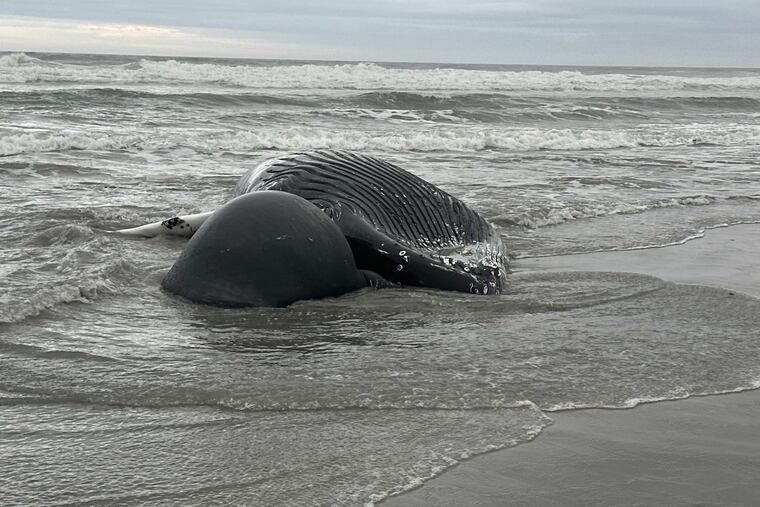For the second time in a week, a young humpback whale was found dead on a Jersey Shore beach
The humpback whale was found on the north end of Brigantine, on state-protected property around half a mile from the site of the former U.S. Coast Guard Station.

A young humpback whale, between 20 and 25 feet long, washed up on the beaches of Brigantine Island Thursday afternoon — the second whale found dead on the Jersey Shore in the last week, and one of seven discovered in New York and New Jersey in a little more than a month.
The whale in Brigantine was found upside-down on the north end of the island, on state-protected property around half a mile from the site of the former U.S. Coast Guard Station, according to a post on the municipality’s Facebook page.
New Jersey’s Department of Environmental Protection, Fish and Wildlife department, and the non-profit Marine Mammal Stranding Center responded to the scene, the post said. The state planned to bury the carcass, according to the post.
It was not immediately clear how the whale had died, and that answer could take “several months” to determine — if at all, the center said in a statement Friday. Plans for a necropsy are under way, the center said, but due to the tide cycle and erosion, the area where the whale is located is hazardous to access. The center’s staff will continue to visit the site during low tide to take measurements and samples to send to experts tasked with investigating whale deaths.
Lauren Gaches, a spokesperson for NOAA Fisheries, said the public should stay away from whale carcasses, which can “move unpredictably in the water.”
» READ MORE: Humpback whale washed up in Atlantic City had a head injury, officials say, as groups call for wind turbine inquiry
The whale found Thursday was the second young humpback to wash up on a Jersey Shore beach in a week. On Jan. 7, a 30-foot-long whale was found dead miles away in Atlantic City with a large head injury — suspected by Marine Mammal Stranding Center officials to have been caused by a large boat.
Fifteen days earlier, another whale was found dead in Atlantic City. And prior to that, one washed up in Strathmere on Dec. 10, and another in North Wildwood in July.
The whale deaths have elicited outcry from Brigantine’s mayor, politicians, environmental and citizens groups, who have called for an investigation into whether sonar mapping for future wind turbine projects near the coast is connected to the four recent washed-up humpbacks in New Jersey.
New Jersey has approved several utility-scale offshore wind projects in the past several years, with a goal of producing 11,000 megawatts of offshore wind by 2040.
Construction on the turbines, which are expected to begin producing power by the end of 2024, has not yet begun.
In a statement, Brigantine Mayor Vince Sera said he was “heartbroken,” and that “protecting and conserving our marine mammal life needs to be the number one priority right now.”
“We call on local, state and federal authorities to conduct a full investigation as to why these magnificent creatures are suddenly dying in high numbers across the same areas where off-shore wind development projects are getting underway,” Sera said, also asking for an “immediate stop” of all work related to off-shore wind activity until necropsy results are available, “so we can all understand the the cause of these sad deaths and how to prevent future losses.”
But others have pointed out that since 2016 — pre-dating any wind energy activity — the National Marine Fisheries Service has designated an “unusual mortality event” for humpback whales along the Atlantic Coast.
Since 2016, 174 humpback whales have died, and necropsies had been performed on about half of them, said Gaches of NOAA Fisheries, an agency tasked with regulating and reducing the impacts of humans on marine animals and their habitats.
Of the whales examined, Gaches said around 40% showed evidence of either a ship strike or entanglement in nets.
» READ MORE: Whales at the Jersey Shore are repeat visitors, yet some don’t survive their encounters with humans
“To date, no humpback whale mortality has been attributed to offshore wind activities,” she said. Gaches also noted that the agency has not sanctioned or proposed — nor have offshore wind developers applied for — any “incidental take authorizations,” which would permit them to “kill marine mammals incidental to any offshore wind activities.”
Staff writer Frank Kummer contributed to this article.